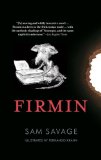Book Club Discussion Questions
In a book club? Subscribe to our Book Club Newsletter and get our best book club books of 2025!
For supplemental discussion material see our Beyond the Book article, Literary Rats and our BookBrowse Review of Firmin.
Please be aware that this discussion guide will contain spoilers!
About this Guide
To escape his hard life on the streets of 1960s Boston, Firmin takes refuge amid the stacks in Pembroke's Books, losing himself in literature's faraway worlds one volume at a time. What makes Firmin unique, though, is not his voracious appetite for reading, but that he actually eats some of the books he's read. You see, Firmin is a rat - a gifted, imaginative rat who possesses a wise soul. In this inspired and poignant novel, Firmin takes readers along as he struggles to survive in the heart of Boston's notorious Scollay Square, revealing what it means to be an animal cursed - and blessed - with human instincts.
The award-winning Firmin has been heralded by Publishers Weekly as "an alternately whimsical and earnest paean to the joys of literature," and the following questions are intended to help direct discussion of this compelling and unconventional tale.
Reader's Guide
- Chapter One of Firmin begins, "I had always imagined that my life story - would have a great first line." How would your autobiography begin?
- Discuss anthropomorphism, the literary device that allows human characteristics to be assigned to non-human beings. Why do you think the author chose to employ this method in the novel? Would the story have been different if Firmin's tale was told by a third party?
- Continuing on this theme, why do you think the author chose a rat as his narrator? Could the story have been told from the vantage point of another animal? What makes Firmin so unique among his brethren in the wild kingdom?
- What did you think of the illustrations throughout the book? Did they enhance your reading experience?
- When Norman, the proprietor of Pembroke's Books, catches sight of Firmin in his perch in the store's ceiling, he sets out to kill the rat - upending Firmin's fantasy of developing a two-sided friendship with the man. Why did Firmin think he would be accepted as anything other than a rodent when Norman discovers him?
- Through Firmin's eyes, we see the city of Boston - particularly Scollay Square - in a time of upheaval and, ultimately, destruction. What was it like to read about the city from an animal's point of view? What did you learn?
- "Could it be that I, despite my unlikely appearance, have a Destiny?" (page 37) What was Firmin's destiny? Why do you suppose he was gifted with the ability to read?
- "The fact is, I had no voice," (page 40). Is there irony in the fact that Firmin could think, reason, and read, but was unable to communicate with any other beings than rats?
- Consider Firmin's propensity for capturing images in his mind and assigning captions to them. Why do you think he did this?
- Talk about Firmin's relationship with Jerry. How much of it was real, do you think? How much of it existed in Firmin's imagination?
- Near the end of Chapter Fifteen, Firmin says, "I had spent a lifetime looking at the world through cracks, and I was sick of it." What does he mean by this statement?
- Firmin hallucinates seeing Ginger Rogers in Jerry's apartment, with her telling him at one point, "Everyone has two jobs, Firmin, a day job and a night job, because everyone has two sides. You do, they do, I do. No one can escape it," (page 159). Do you agree with the sentiment that each person has two sides to their personality? What were Firmin's two sides?
- Discuss Firmin's slow trip back to his birth home, in the basement of the bookstore. Was it meaningful that he chose to return there?
- " 'But I'm loothing them that's here and all I lothe. Loonley in my loneness,' " (page 163). Here, Firmin quotes one of the ending lines in James Joyce's Finnegan's Wake. Is there significance in Sam Savage's choice to include this line in the ending of Firmin?
Unless otherwise stated, this discussion guide is reprinted with the permission of Delta.
Any page references refer to a USA edition of the book, usually the trade paperback version, and may vary in other editions.
